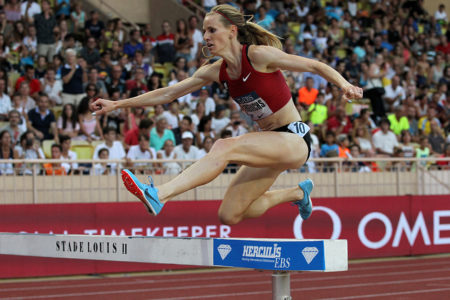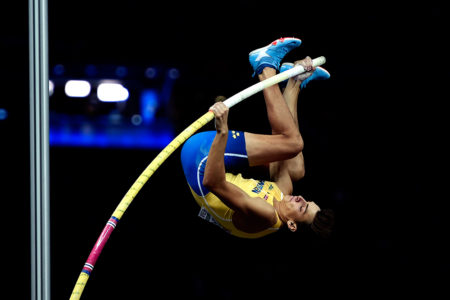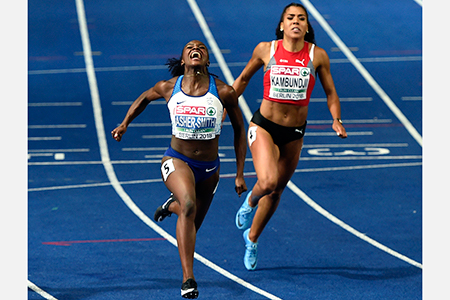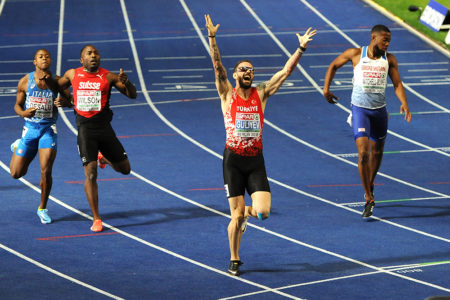
Berlin, Germany; August 11—With one day left in the meet, Dina Asher-Smith and Jakob Ingebrigtsen stamped themselves as the biggest heroes of the European Championships, each winning a second gold. With a crowd of 60,000+ looking on the British speedster added the 200 to her earlier 100 honor and the young Norwegian tacked on the 5000 win to yesterday’s 1500 triumph.
Asher-Smith had handled the century field with relative ease on Tuesday, equaling the yearly world lead with her 10.85 PR, but figured to have a bit tougher task in the half-lapper, what with 2-time world champ Dafne Schippers to contend with. Schippers, drawn in 4, would have the advantage of being a lane inside Asher-Smith, able to keep her in sight. The Briton quickly made a vanishing target, however, as she burst from the blocks and made up the stagger on lane 6’s Jamile Samuels before they reached the straightaway. With Asher-Smith having a 4-5m lead, it then became a question of whether or not Schippers’ ability to maintain speed in the second half of the race would be enough. It wasn’t. She pulled back a meter or two, but ended up well down as DAS added another world lead to her honors with a PR 21.89. The Dutch pair of Schippers (22.14) and Samuels (22.37 =PR) claimed the other two medals.
“It’s been a crazy championships!” said Asher-Smith. “I really wanted to do a good time, but wasn’t expecting to take the WL in the 200m. I had a lot of fun, and didn’t expect to run this fast when I’m still tired from the 100m final. I know this is not the Olympic Games or the World Championships, but I’m still very proud of myself.”
Andreas Kramer of Sweden took the men’s 800 out at a rather pedestrian pace covering the first 200 in 25.04. Back in 7th at 25.68 was reigning world champ Pierre-Ambroise Bosse. The Frenchman had waited until the final 200 to make his move in London last year, but here he surged into the lead in the second half-lap, hitting the bell at 53.14. On Kramer’s shoulder (53.47) cagey Pole Adam Kszczot was well-placed in 3rd (53.57). They stayed in that order down the backstretch, but on the final curve Kszczot, the 2-time defender, began an irresistible surge that saw him cover the last 200 in 25.53 as he came home in a seasonal-best 1:44.59. Kramer (1:45.03 =NR) overhauled Bosse (1:45.30) in the last half of the homestretch. Great negative-split running: Kszczot 53.57/51.02, Kramer 53.47/51.96, Bosse 53.14/52.16.
Said Kszczot, 28, “I was really nervous before the start so I am so glad I made the final and defended the title. I did something that nobody else did before: I won 3 titles in a row and I feel so emotional to make history. Winning this title was four times harder than the one in 2014. Always, it is getting harder and harder. The guys are so strong and I knew it was going to be hard.”
That the women’s long jump wouldn’t go according to form became apparent when defending champion Ivana Španović could not compete after suffering a partial rupture of an Achilles in the qualifying. It got even less formful in round 3 of the final when world leader Lorraine Ugen fouled, her best of 21-2 (6.45) leaving her in 9th with no jumps coming in the final 3 rounds. Instead, the day belonged to Malaika Mihambo, who had lost most of the ’17 season after a freak foot injury suffered when she slipped on some stairs. The German had languished in 10th after the first two rounds but soared to a winning distance of 22-1¾ (6.75) in round 3.
Mihambo’s biggest challenger looked to be Briton Shara Proctor, who launched her 21-11½ (6.69) in round 4. Jazmin Sawyers 21-10¼ (6.66) and Maryna Bekh 21-10¾ (6.67) put themselves into the picture in round 5. In the final stanza, the action got even more lively. Sawyers flew a 21-10¾ of her own to edge into 3rd. Proctor improved to 21-11¾ (6.70) for 2nd. Then Bekh leaped 22-1 (6.73) to snatch silver for good. Mihambo concluded the action with a 22-1 (6.73) that underscored her victory. That it was the most modest winning distance since ’74 did not phase Mihambo, who said, “This time I did it the hard way.”
The Youngest Ingebrigtsen Dazzles Again
Again, Jakob Ingebrigtsen made it look easy, the teenager romping to victory in the 5000 after taking control of the race before the 3800 mark. The race had been a steady yet tame affair to that point with Switzerland’s Julien Wanders leading a sizeable pack through 3000 in 8:04.91. After conferring with brother Henrik mid-race (third brother Filip didn’t run, his soreness after his fall in the 1500 heats now diagnosed as a broken rib), Jakob moved to the front and upped the ante. With a confidence belying his years, the Norwegian sensation then kicked from the front, covering his final 800 in 1:56.04, his last circuit in 54.09. Henrik joined him on the last lap as they pulled clear from France’s 10K gold medalist Morhad Amdouni and Italy’s Yemaneberhan Crippa.
Jakob won in a European Junior Record 13:17.06, with Henrik taking silver in 13:18.75. Amdouni held off fast-closing Crippa for bronze, 13:19.14–13:19.85. “It was a little crazy to get this medal today, this is huge!” said the victor. “Winning a second title in two days is also the result of having done this my whole life.” Said Henrik, “This could only feel better if Filip was here to take the bronze medal. But he is still part of the team; we’re all in this together. Both my medal and Jacob’s tonight will feel like a victory for him, too.”
Steeple winner Mahiedine Mekhissi had planned on a double-win meet also, but withdrew from the 5000 without explanation.
Spain’s Álvaro Martín held back from the early pace of Germany’s Christopher Linke in the 20K Walk, waiting until 15K before darting ahead of the pack on the 20-lap course to pull away for the win in 1:20:42. “It was a tough race,” said Martín, who won the first big title of his career. “I was waiting for Linke to lose touch with the rest of the group, but it wasn’t easy. There were many German fans out here today.” Silver medalist Diego García walked alongside Martín until the final 2K, holding on for a 1:20:48 finish and a Spanish 1-2. The battle for bronze was spirited, with Russian Vasiliy Mizinov holding off fast-closing Italian, Massimo Stano, 1:20:50–1:20:51. Early leader Linke faded to 13th.
Initially, the plan had been for the women’s 20K Walk to go off 2 hours before the men’s, but a suspected gas leak in the city center caused firefighters to delay the event, forcing organizers to scramble to put on both walks simultaneously. Czech Anežka Drahotová led for much of the way before Mária Pérez flew over the final 3K to capture Spain’s second gold of the morning. Pérez clocked 1:26:36 to knock down Olimpiada Ivanova’s ’02 meet record by 6 seconds. Drahotová took the silver in 1:27:03, well clear of bronze medalist Antonella Palmisano (1:27:30).
For someone who has dominated the women’s discus for so long, Sandra Perković likes to live dangerously, frequently flirting with foul trouble. She was red-flagged on her first attempt and then couldn’t broach the 60m (196-10) line on her next two throws and found herself in 3rd at a mere 196-9 (59.97). Then came another foul and Nadine Müller of Germany (a seasonal best 206-8/63.00) was two rounds from victory. But the Croatian favorite looked like her old self in round 5, spinning one out to 221-10 (67.62). Müller hadn’t thrown that far in a half-dozen years and didn’t here either. Perković, still only 28, thus became the first ever to win a Euro title 5 times.
Said the winner, “I have a new slogan now: ‘Sandra, give me five!’ During the competition, I was thinking about my mother who is always very nervous watching me on TV. So I started to think about her and I imagined how nervous she must be at home seeing me not throwing so well. Then I managed to finally improve and I smiled for the camera. But suddenly, I saw her in the crowd. She came here to surprise me.”
Mateusz Przybylko of Germany and Maksim Nedasekau of Belarus staged an entertaining battle in the men’s high jump. Przybylko never trailed, clearing the first 6 heights on first try. He pulled into solo possession of the lead when he scaled 7-7¾ (2.33). Nedasekau also cleared that height—equaling his PR—on first try, but he had failed twice at 7-5¾ (2.28) before boldly passing to 7-7 (2.21) which he made on his sole available attempt. Both had set the bar trembling on their 7-7¾ clearances, so the next height 7-8½ (2.35) wasn’t going to come easily. Indeed, it was too much for Nedasekau, just 20, but Przybylko, 6 years his senior, just managed to slide over on his first try. After a second miss Nedasekau tried once and failed at 7-9¼ (2.37), which the German passed. The winner made one token attempt at 7-9¾ (2.38) before shutting it down. “The Belarus guy was strong,” he said. “When he cleared 2.33m I told myself ‘I have to go over the bar now.’”
Justyna Święty-Ersetic, long a key leg on the successful Polish 4×4, finally arrived on the stage as a solo runner, crushing her personal best of 51.05 with a 50.41 that tagged Greece’s fast-starting María Belibasáki in the final step of the 400. The Pole, in lane 3, was close to last place at the 100, while Belibasáki built a solid lead on the backstretch. Even at the 300, the Greek still had 4m on Święty-Ersetic, who was closing fast. In 2nd, Belibasáki (50.45) nailed the Greek Record, and bronze winner Lisanne de Witte broke the Dutch Record with her 50.77.
“I am shocked, really surprised,” said the winner, whose time made her the No. 2 Pole ever, after the 49.28 NR of the recently passed legend Irina Szewińska. “The only complication is now that I have to get ready for the 4 x 400 relay which starts in 90 minutes.”
An NCAA-like 90 minutes later Poland would not be denied. Even with two of its runners having scored PRs in the 400, the red & white went to the front at the first exchange and never let up. Małgorzata Hołub-Kowalik’s 52.3 put the Poles ahead of Britain (52.5) and France (52.6).
On the second leg, Iga Baumgart-Witan—who had placed 5th in the 400 with her PR 51.24—ran 51.3, falling back to 4th before charging back on the stretch to hand off in the lead. At halfway, the depth of the race became clear. Poland (1:43.63) led Belgium (1:44.10), with France (1:44.40), Britain (1:44.42), Italy (1:44.53) and Germany (1:44.61) close behind.
With Patrycja Wyciskiewicz running 51.25 up front, Italy’s Raphaela Lukudo stormed to 2nd at the final exchange with her 51.03, just ahead of France at the handoff. On the anchor, Święty-Ersetic was passed by France’s Floria Guei on the backstretch but reeled her in early on the final straight, sealing a 3:26.59 Polish win with a 51.71 leg. France held second thanks to Guei’s 51.59, while Eilidh Doyle produced a 51.50 to give Britain the bronze.
Said Hołub-Kowalik, “This is a special moment for our country as we won our first European title in this relay. I am so proud of our girls and especially of Justyna as she managed to get ready for the relay after she won the individual event.”
Belgium’s answers to Norway’s Ingebrigtsen brothers are the Borlée brothers: Dylan (46.1 leadoff) combined with Jonathan (44.7 second leg) & Kevin (43.91 anchor), plus third leg Jonathan Sacoor (44.70) to produce a 2:59.47 winner and a successful title defense. Spain had an 0.44 lead at the final handoff and Bruno Hortelano tacked maybe another 10th onto that in the first 200. But Kevin, very savvy at the 4×4 craft after NCAA experience at Florida State pulled smoothly away in the homestraight to score the win. The fading Hortelano was caught and passed by Britain’s Martyn Rooney (44.24) for the silver. Said Jonathan Borlée, “We have been running the 4×4 since Beijing and every time we have been in the final. We always give our best in the relay.”
Saturday’s Medal Winners
Men’s 800
Adam Kszczot (Poland), Andreas Kramer (Sweden), Pierre-Ambroise Bosse (France)
5000
Jakob Ingebrigtsen (Norway), Henrik Ingebrigtsen (Norway), Morhad Amdouni (France)
20K Walk
Álvaro Martín (Spain), Diego García (Spain), Vasiliy Mizinov (Russia)
4 x 400
Belgium, Great Britain, Spain
High Jump
Mateusz Przybylko (Germany), Maksim Nedasekau (Belarus), Ilya Ivanyuk (Russia)
Women’s 200
Dina Asher-Smith (Great Britain), Dafne Schippers (Netherlands), Jamile Samuel (Netherlands)
400
Justyna Święty-Ersetic (Poland), María Belibasáki (Greece), Lisanne de Witte (Netherlands)
20K Walk
Mária Pérez (Spain), Anežka Drahotová (Czech Republic), Antonella Palmisano (Italy)
4 x 400
Poland, France, Great Britain
Long Jump
Malaika Mihambo (Germany), Maryna Bekh (Ukraine), Shara Proctor (Great Britain)
Discus
Sandra Perković (Croatia), Nadine Müller (Germany), Shanice Craft (Germany)
Finals on tap for Sunday’s final session: men’s marathon, 4×1, PV, TJ; women’s 1500, steeple, 5000, 4×1, HT. □






